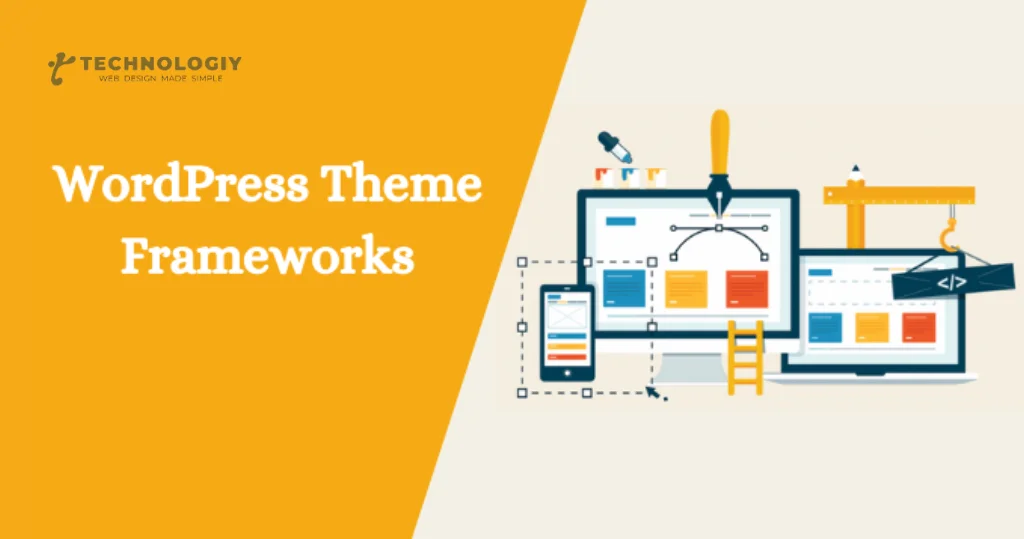Mastering WordPress Theme Frameworks: A Comprehensive Guide If you’re a website developer or designer working with WordPress, you’ve likely heard of WordPress theme frameworks. These powerful tools provide a solid foundation for building custom WordPress themes, saving you time and effort in the process.
In this comprehensive guide, we’ll dive deep into WordPress theme frameworks, exploring their benefits, key features, and how to master them.
What are WordPress Theme Frameworks?
WordPress theme frameworks are pre-built themes that serve as a starting point for developing custom WordPress themes. They provide a robust set of features, functions, and code snippets, allowing developers to create beautiful, responsive, and feature-rich themes without starting from scratch.
Benefits of Using WordPress Theme Frameworks:
Time Efficiency:
By utilizing a theme framework, developers can skip the initial setup and start building upon a solid foundation. This saves considerable time, enabling developers to focus on customizing and fine-tuning the theme according to their clients’ needs.
Consistency:
Theme frameworks ensure consistency across different projects. They provide a standardized structure and coding practices, making it easier for developers to maintain and update themes over time.
Flexibility:
WordPress theme frameworks offer a wide range of customization options. Developers can easily modify layouts, add custom widgets, and implement advanced functionality, all without the need for extensive coding knowledge.
SEO Friendliness:
Many WordPress theme frameworks are designed with search engine optimization (SEO) in mind. They come with built-in SEO features, such as clean code, optimized page loading speed, and compatibility with popular SEO plugins, giving your website a head start in terms of search engine rankings.
Key Features of WordPress Theme Frameworks:
Responsive Design:
In today’s mobile-first world, having a responsive website is crucial. WordPress theme frameworks come equipped with responsive design features, ensuring your website looks great on any device or screen size.
Customization Options:
Theme frameworks offer an array of customization options, including color schemes, typography settings, and layout variations. This allows you to create a unique and visually appealing website that aligns with your brand or client’s brand identity.
Widget Areas:
Theme frameworks often include predefined widget areas, making it easy to add and position widgets within your theme. This gives you the flexibility to showcase dynamic content and enhance user experience.
Plugin Compatibility:
WordPress theme frameworks are built to seamlessly integrate with popular WordPress plugins. This compatibility allows you to extend your website’s functionality effortlessly, whether it’s adding contact forms, implementing eCommerce features, or integrating social media sharing buttons.

Mastering WordPress Theme Frameworks:
Choose the Right Framework:
There are numerous WordPress theme frameworks available, each with its own set of features and customization options. Research and choose a framework that aligns with your specific project requirements and coding expertise.
Study Documentation and Tutorials:
Familiarize yourself with the chosen theme framework’s documentation and tutorials. Understand the framework’s structure, functions, and how to make the most of its customization options.
Practice and Experiment:
The best way to master WordPress theme frameworks is through hands-on practice and experimentation. Set up a local development environment, start building sample themes, and explore different customization possibilities.
Stay Updated:
WordPress and its ecosystem are continuously evolving. Stay updated with the latest releases and improvements in your chosen theme framework. Regularly check for updates, security patches, and new features to ensure your themes are up-to-date and compatible with the latest WordPress version.
WordPress theme frameworks are powerful tools that streamline the process of creating custom WordPress themes:
By leveraging their benefits, features, and customizability, developers can save time, maintain consistency, and build visually appealing websites with ease. Mastering WordPress theme frameworks requires practice, experimentation, and staying updated with the latest industry trends. So, dive in, choose the right framework, and unlock the potential of WordPress theme development.
Optimizing SEO with WordPress Theme Frameworks:
Tips and Tricks In today’s digital age, having a strong online presence is crucial for businesses and individuals alike. One of the most effective ways to enhance your website’s visibility and reach is through search engine optimization (SEO). And when it comes to building and optimizing websites, WordPress is undoubtedly one of the most popular platforms out there. But did you know that using WordPress theme frameworks can take your SEO game to the next level? In this blog post, we will explore the tips and tricks for optimizing SEO with WordPress theme frameworks.
WordPress theme frameworks serve as the foundation for your website’s design and functionality. They provide a solid structure that allows you to customize and build upon it to create a unique and visually appealing website. What makes theme frameworks even more powerful is their ability to optimize your website for search engines, ultimately improving your chances of ranking higher in search engine results pages (SERPs).
Here are some tips and tricks to consider when optimizing SEO with WordPress theme frameworks:
Responsive Design:
A responsive website design is crucial for SEO success. With more and more users accessing websites through mobile devices, search engines prioritize mobile-friendly websites. WordPress theme frameworks often come with built-in responsiveness, ensuring that your website looks great and performs well on any device, including smartphones and tablets.
Speed Optimization:
Page loading speed is a critical factor for both user experience and SEO. Websites with slow loading times not only annoy users but also receive lower rankings from search engines. WordPress theme frameworks are designed with speed in mind, offering lightweight code and optimized assets to enhance your website’s loading time. Ensure you choose a theme framework that prioritizes speed for better SEO performance.
SEO-Friendly Markup:
WordPress theme frameworks often come with built-in SEO features, such as schema markup and semantic HTML5 tags. These help search engines understand the content and structure of your website better. By utilizing SEO-friendly markup, you can improve your website’s visibility and organic traffic.
Customizable Meta Tags:
Meta tags, including meta titles and meta descriptions, play a crucial role in SEO. WordPress theme frameworks allow you to easily customize these meta tags for each page, ensuring that your content is optimized for search engines. Craft compelling and keyword-rich meta tags that accurately describe your page’s content to improve click-through rates and organic traffic.
Integrated SEO Plugins:
WordPress offers a wide range of SEO plugins that can further enhance your website’s SEO capabilities. Many theme frameworks integrate seamlessly with popular SEO plugins, such as Yoast SEO or All in One SEO Pack. These plugins provide additional features, such as XML sitemaps, breadcrumbs, and social media integration, to boost your website’s visibility and rankings.
Clean Code:
Clean and well-structured code is essential for search engines to understand and index your website properly. WordPress theme frameworks are typically developed with clean code practices, reducing the chances of errors or conflicts that can hinder your SEO efforts. Opting for a theme framework with clean code ensures a solid foundation for your SEO optimization.
Regular Updates and Support:
Search engines constantly evolve, and staying on top of SEO trends and best practices is crucial. WordPress theme frameworks that offer regular updates and reliable support ensure that your website stays optimized and compatible with the latest SEO standards. Regular updates often include bug fixes, performance improvements, and new features that can benefit your SEO efforts.
By harnessing the power of WordPress theme frameworks, you can optimize your website for better search engine rankings and increased organic traffic. Remember to choose a theme framework that aligns with your SEO goals and offers the necessary features to enhance your website’s visibility. With the right theme framework and implementation of SEO best practices, you can take your website’s SEO potential to new heights.
In conclusion, WordPress theme frameworks provide an excellent opportunity to optimize your website’s SEO performance. With their responsive design, speed optimization features, SEO-friendly markup, customizable meta tags, integration with SEO plugins, clean code, and regular updates, theme frameworks offer all the necessary tools and resources to boost your website’s visibility in search engine results. So, if you’re looking to enhance your website’s SEO capabilities, consider leveraging the power of WordPress theme frameworks.
